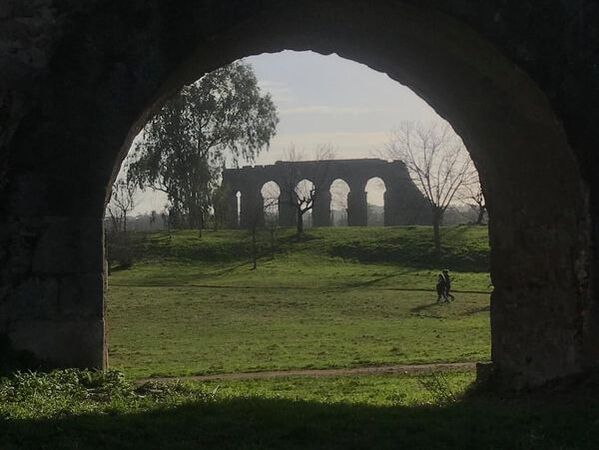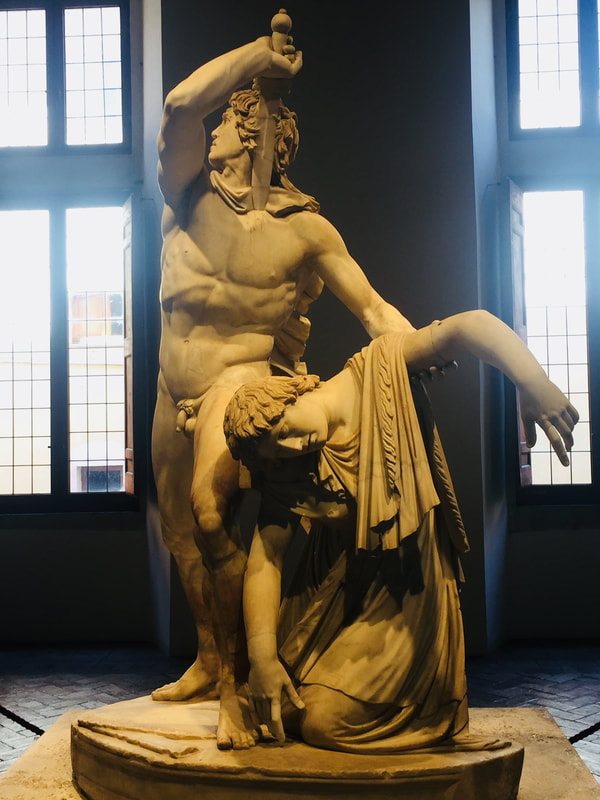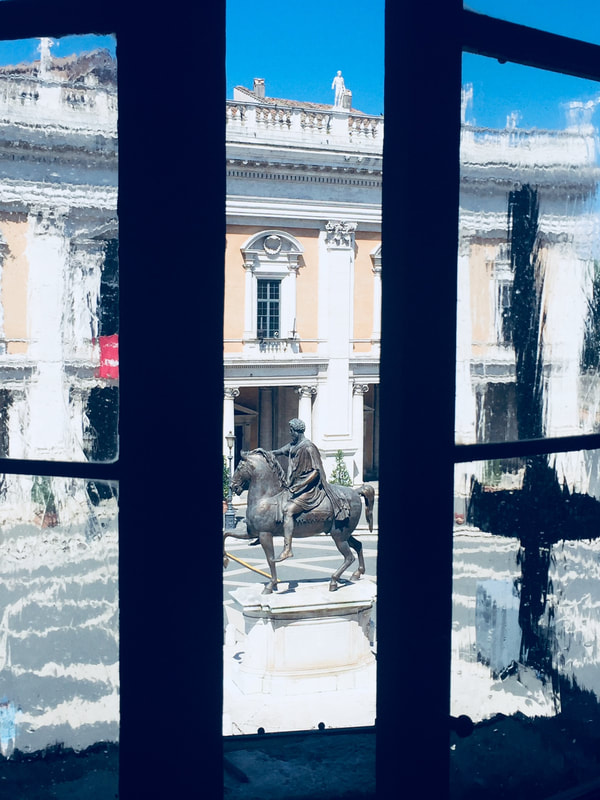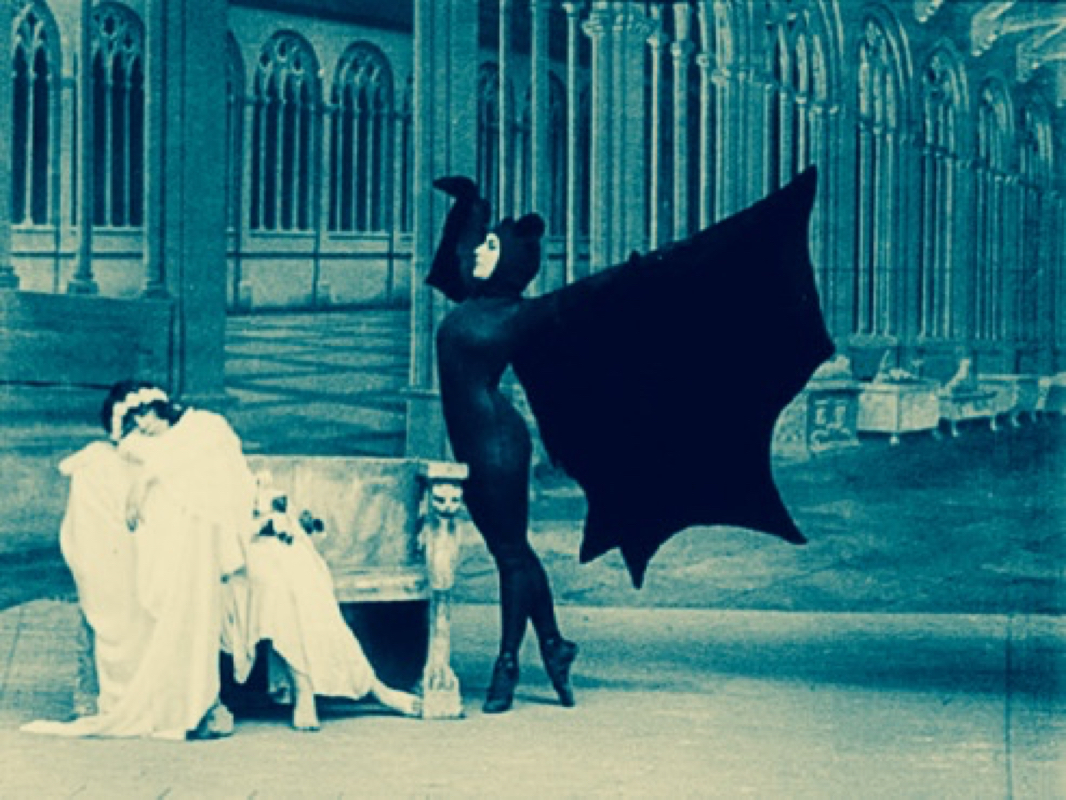|
If you've arrived fresh and raring to go with some Rome recommendations, you may want to check out the previous couple of posts that are more focused on the central historical zone.
In this post, we are venturing out of the city centre into one of the most amazing parts of inner city Rome.
0 Comments
I've spent ten years on and off living in the Eternal City. In the interests of sharing a bit of what I know (and what I like), this is the second in a series of posts about my recommendations for you in Rome. It's true that you can spend a lifetime visiting Rome, but you'll only want to if you have a good time each time you pass through. So, for this post, I'm assuming you've made your way to the Spanish Steps and that you're ready to venture further into Centro Storico. I've now spent a decade living in Rome and although COVID and all its mutations continue to swirl around, it's almost refreshing to see the hordes of tourists coming back to town.
When Rome is open for business, my inbox tends to get a little more busy than usual, with friends asking me for some recommendations about what to do and see and when to do it. The following is the first in a series of insights about Rome. They're based on my opinions and experiences, so don't come trying to sue me if you don't agree. For this post, I'm focusing on the central areas of the historic centre, along with Termini. Things change, good places go bad, and bad places improve, so take everything with a grain of salt. I'm a dual national, so, in more prosperous times, I'm often lucky enough to spend some time in my hometown (Melbourne) as well as Rometown (Rome).
Obviously, COVID19 has thrown all that out the window. I've spent almost a year now working mostly from home - feeling a bit Hitchcocky constantly looking out my rear window - as I work away on my day job and my writing. With Australia's closed border policy, and restricted movement in Italy due to the ongoing high number of COVID19 cases here, there are times when I feel neither here nor there, a sentiment that I think we've all been feeling this last year. That said, with the lifting of some restrictions here in Rome, I managed to escape out to the Palazzo delle Esposizioni to check out the 2020 Quadriennale. I did have a date back in October to see the Quadriennale with two of my most dedicated gallery loving friends, but we were sent into lockdown the day before we were due to see the show. It's billed as Fuori (=out in Italian) and, as pan-contemporary exhibitions often do, it left me delighted and perplexed (and sometimes just plain unimpressed). But that said, I was so hungry to get out of my living room and experience some culture first hand, that even when I found the artwork underwhelming, I was just happy to be seeing things through someone else's perspective for a change. As a huge exhibition designed to push the boundaries over two enormous levels, there were obviously still some gems in the line up. Among the highlights for me were Irma Blank's gorgeous indigo blue panels. They sent me back to Japan and the old ukiyo-e prints that I studied at uni. Also enjoyed the playful nature of the work by the Tomboys Don't Cry collective and the adjoining room in which Diego Gualandris did things with painting and textiles that I've never seen someone do before and Raffaela Naldi Rossano had my fatigued little brain working overtime until it eventually decrypted her powerful textual messages. Getting out and about to take in some culture or feed off of other people's ideas is not an easy prospect at this point in time. And maybe you're neither here (Rome) nor there (Melbourne). But wherever you are, you can take a free virtual tour of the Fuori show if you're interested. It's a lovely 360 of the huge exhibit that allows you to take in the cavernous spaces and representations of all the artwork in the show. Want to get out? Do it here.  What a busy year. My job has eaten away much of the time I usually spend writing and researching, but a boy's gotta pay the bills... and have something that resembles a social life. A boy's also gotta travel. See things. Get inspired. Aside from having a bit of a Roman summer, I'm moving around the country a bit, visiting people and places and getting back into the swing of seeing as many exhibitions as possible. Recently I finally got around to visiting Macro's Street Art exhibition Cross The Streets. I had rocked up to the opening night but it was a mess and there were too many people and too little organisation to make it worth my while. So I headed back and visited - curious to see the work of a friend of mine who has a substantial number of works in the exhibit. As chuffed as I was for him, I'm a bit indifferent about institutions hosting street art, and about how selective the exhibit was. All I will say is that you can't have a major street art show in Rome, which in recent years has become a major centre for open air/street art and not include the works of Hogre. That said, I did love the work of Lucamaleonte (pictured). His tumblr feed here.  Yes, yes. You - like most of the international press - were so excited about the prospect of Rome having its first ever female mayor. And one who has promised to make it a transparently run city free of graft and the sordidness of Mafia Capitale. Romans on the other hand looked at the new mayor like the best of the worst- a rejection of the establishment more than anything else. But Virginia Raggi is struggling and just a couple of months in has already been plagued by high profile resignations, accusations of improper process and, worse still in the eyes of Italians, incompetence. After watching some of the Rio Olympics I've decided that I too want to become an Olympian. I'm thinking something sexy like archery or shooting or the like so that I get to maintain my current physical state and still get to be an Olympian. But it looks like Raggi is going to quash my dreams of competing in Rome in 2024. It looks like Rome is not going to proceed any further in its bid to host the games. On this one, I can't say I blame the mayor. Rome is still having all sorts of woes with the basics that it has never been able to achieve; sanitation and transport. They're the issues that are as eternal as the city itself. You might notice the occasional stink if you're in Rome, but if you're planning on visiting Rome you'll barely notice the transport problem. You can see most of its greatest hits on foot and there are a plethora of sightseeing buses that offer pretty comprehensive itineraries. But if, like most Romans, your plans don't necessarily revolve around the Colosseum or the Vatican, you might just want to do as Romans do- or as Audrey Hepburn and Gregory Peck once did- and experience it from the back of the scooter. "But Italian roads are terrible" I hear you cry! It's true. A lot of Italians drive like insane people but most Italians are capable of driving alongside the hoons and getting from A to B quite safely. And in Rome moving from A to B isn't always logical when it comes to transport. I have a friend who has to travel 15km as the crow flies to get to work. That takes her almost two hours by public means. So, to that end, the newish batch of apps that have hit the market make a lot of sense to Romans, and the more adventurous folk amongst you. You see you can now choose from a variety of apps to organise a scooter pick up. You'll get picked up and taken wherever you want to go in the Eternal city for just €3 a ride. It's Uber, Roman style! Of course there are restrictions on how much of Rome is actually serviced, but if you want to see the sights from a scooter ala Audrey I can highly recommend it. It's bumpy but there's nothing quite like it! So my Olympic journey is not likely to take me out into outskirts of Rome where they'll have spent millions making stadiums that will then go unused, but next time I'm in town, I just might treat myself to a little nip about town on the back of a scooter to remind myself how beautiful that city is regardless of its eternally incompetent administration.  I just spent the last month back in my hometown of Melbourne. I have to say aside from having the chance to spend time with family and friends, and to soak up the Australian summer amidst the backdrop of events like Midsumma and the Australian Open, being back in Australia was like a breath of fresh air. This is my sixth year in Italy, and getting on the plane to come back here was difficult, not just because I was coming back to winter, but also because it meant re-entering the fraccas that is the never ending polemica. Today is Australia Day and there are some major ongoing issues that need confronting in Australia including the divide between rich and poor, ongoing racism and a growing anti Muslim stance, but for the most part I think Australians are a tolerant and respectful bunch. Differences of opinions are rarely the source of deep divisions in society and in the media. It's not often a case of us versus them, let's just say. Here in Italy, things are different. Italy, in my mind, has to be one of the capitals of divisive thought. A fractured, splintered media makes a huge contribution to this, as does the existence of organizations like the Catholic Church. There are so many entrenched, vested interests in this country that it feels as if Italians are stuck under a net so intricately weaved that if they ever make it up to the surface, the only thing they are capable of doing is taking shallow breaths. I'm Australian and my partner is Italian. We've been together for more than five years. The thing is we come from two opposite spectrums of the world: I'm from the new world and he's from one of the historic centres of the world as we know it. Yet, as an Australian and an Italian we both share one thing in common. We both come from the last Western countries in our cultural worlds that don't offer equality marriage. Italy is the last major Western European nation that doesn't recognise same sex unions, and Australia is the last major country in the Anglosphere that hasn't enshrined things in law. Now, don't get me wrong. It's not like I want to get to married. In Australia, my long term relationship with my partner is technically recognised to some extent by the existing de facto laws there. But not wanting to get married and not even having the choice or right to choose really infuriates me. What do you care? You might think. You're happy - you've been together for five years, what will a piece of paper change? Nothing. Not on a daily basis. But not all people marry because they want to feel different about each other. Some people marry for practical reasons. And married friends who have been together less time than I've been with my partner have a host of financial, employment and medical rights that we can only dream about. What do you care? Well. Let me illustrate how this works. You see, I come from a state in Australia called Victoria. Although Australia doesn't offer same sex unions or marriage, Victoria at least recognises same sex unions from other countries, has just passed same sex adoption laws and at the moment offers a register (although as it is purely symbolic why would I bother?). And if something happens to you, you need the protection of the law. As a human being, if something happens to me or my partner, I would like to think that either one of us would have the support and the right to decide what happens, what needs to be done, and that the other will be protected. For those who aren't able to comprehend what this means on a human basis, Iet me draw your attention to this recent and shocking set of events that occured in South Australia, Victoria's neighbour state which doesn't recognise foreign same sex unions. This is the senseless, inhumane setting in which same sex couples exist in many countries. Even with the protection of the law it's not a fun and games scenario. So, having travelled over 30 hours to get back to where I am now based, two hours after landing at my local airport, I found myself in a piazza in Lecce at a demonstration. And why was I there on Saturday? Because this week, the Italian parliament is due to debate the Renzi government's bill to introduce same sex civil unions. The bill is likely to be defeated? Why? Because of a provision for same sex couples to adopt which has courted the ire of the Catholic Church which is deeply entrenched in the Italian political system (and surprisingly, also incredibly powerful on the Australian political right- hence the failure to legislate despite overwhelming public consensus). Now I am all for everybody having their own opinions. I believe it is your right as a persoon to choose not to agree with certain aspects of a wider society. I get that. I don't agree with it, but you as a person are entitled to your opinion. But in my books, what nobody is entitled to is the denial of an identical set of rights to another group of people or individuals. I respect and value your life and I expect you to do the same with me. And as a result I am infuriated by news in recent days that the Catholic church speared Family Day demonstations (as cynical a name as possible for an event which seeks to diminish any idea of a family that doesn't correspond to what the Catholic church defines as 'normal') are privvy to yet more rights at the expense of others. This time, transport group Italo is offering discounts to those in Italy who would like to attend the Family Day demonstration this coming Saturday in Rome. This on top of local churches who are offering a 50 euro picnic+demonstration package to parishioners who agree to attend the marches. Even the city of Rome's public transport group is offering discounts. I made my own way to the demonstration on Saturday. I didn't get offered a discount for that, and I attended in part because I demand the right to be treated equally under the law as anyone else. What I don't appreciate is that aside from the ridiculous hipocrisy of the organisers of Family Day (the idea of a twice divorced, philandering politician and priests who have no idea what modern life resembles), their push to ensure that the GLBT community continues to live on the fringes of what is acceptable in society and by law is being backed by both public and private organizations. I won't even go into the idea that some churches are even offering a cash handout to those who are willing to head to Rome for the day. All that is left to ask is, is this the kind of world that we should be living in today in 2016? How is this acceptable in any place in the world? Appalling. I'm not anti Catholic, but I tell you what, living in Italy really makes me wonder whether common sense simply suggests I should be.  It's not that I'm sorry. I'm not. But its coming up to six years that I've been writing this blog, and as a result, there's room to revise some ideas from time to time. Not for example on selfie sticks, or on anything Vatican-y (except Ratzinger and Padre Georg: I loved them: such a cute couple!). But a while back I posted about how Taschen and Gisele Bundchen had teamed up for a Gisele coffee table book. A very expensive, don't head over to the bookshop if you're having trouble with the rent or your mortgage payment kind of book. I mean, I didn't say it was going to be a flop or anything, but I guess I was questioning the whole Why? of it all as Tim Gunn would say. Well, we needn't worry for GB. Girl's gonna have no problems paying her rent and in selling out her ludicrously overpriced book she has proven that there are a lot of people with some warped priorities. Like your coffee table book could feed a village kind of shit, but what would I know? But really, was there really any doubt its run was going to sell out? Supermodels are recession proof! Someone needs to bottle their essences and study that stuff at the Harvard Business School to better prepare us for when there are no arms sellers left in the world to keep the economy spinning. (I know that sounds a little Silence of the Lambs but I don't mean it in that way).  Anyway, while I'm at it... Almost six years ago I moved to Rome. And I was immediately struck by how street art was still in its infant stages even though graffiti per se has existed in Rome since, well, Roman times. Back then when I posted about the burgeoning scene I thought it was going to take a while for Rome to get to a point where its edginess as a city was matched by what you see on its walls. Well, lo and behold. I sit corrected. When the Huffington Post calls you out for being the emerging European capital of street art, you can start to believe it. It's not really mentioned in the article, but there are a few reasons why certain parts of Rome are becoming open air galleries. On the one hand, galleries like the Wunderkammern in Tor Pignatara and the colletive Laszlo Biro - (hi boys) - have had a huge hand in this. They paved the way for much of East Rome's street art/urban renewal by encouraging large scale projects in conjunction with residents and the local municipal offices. Or by simply producing great, very graphic friendly work (as in the case of the LB crew). In addition, a lot of Roman suburbs are the subject of wear and tear. Asking a tenants committee if an artist can have an external wall in exchange for its repair and adornment is a no brainer in cash strapped Rome. Keep an eye out though for other emerging hot spots in Italy. Palermo and Genova are the cities to watch for if you ask me. They've got some great up and coming scenes and artists that rival what's happening in Rome and Milan. In the meantime, you can find Laszlo Biro here and the Wunderkammern here. I spent the weekend in Rome catching up with some of my nearest and dearest. And while I did that I had the chance to meet some friends of friends. They're currently working on a really cool project at Rome's biggest exhibition space, Palazzo Delle esposizione, which is on Via Nazionale. In recent years the multifunction site has become one of Rome's most important and has hosted some major blockbusters (some of which I was tasked to write reviews for). But the site is also home to a little known cinema which runs some of the most amazing retrospectives and mini film fests- often for free or for a pittance. Anyway, FOF (that's a new acronym I've decided I'm going to use; Friend of friend) was telling me about his rather ingenious project that he's currently involved in there. Way back in time, and I'm talking silent movie time, people, les vampires had tongues wagging. It was a kind of silent series with a crime bent that just had cinema goers going nuts. Musician by day and crim by night teams up with a reporter as they take on the dark, noirish (I think I just invented that word too) Parisian nights and the inbuilt criminal element. It's the kind of stuff that inspired a million copy cats and that continues to do so. Well, the PDE is currently running a brilliant series of events based around Les Vampires- using ten of the original episodes but partnering them with musical and visual interpretations. A series of musicians and groups have been invited to play alongside the footage and basically add their own interpretation to the old classics. What I love about the project is how it seems to be built around adding an appreciation to three different mediums, and bridging time as well as the visuals and sonics together. I think it's a really inspired idea which of course has been done with other things but, adding such an element to the silent films is effectively bringing them back to life in the face of a million other reincarnations and references. Sounds pretty brill if you ask me- and runs until November 15, so if you're in Rome over the next week or so, visit the PDE site which has a full run down of events in English in addition to the other things on at the complex. There are certain things that we all consider necessary in the big smoke. Transport, medicine, sanitation, utilities...these are the kinds of essential services that our cities tend to revolve around. Some get it right- and that's often a matter for Monocle or whoever to decide as to how well- and others have problems with even the basics. Having spent a really long time in Italy (and Rome in particular)I can tell you that some cities here get it right and that some...um...don't. Or can't. But if it's any consolation nobody seems to be happy about how things are run: those in service and those who use service are all often miserable. The most noticeable thing that goes wrong in a place like Rome is the transport. Let's face it. It's really shit. If you were to set your watch by the next due bus you'd be the new Marty McFly. Honestly, it's the worst public transport system I've seen in Europe, but whatevs. One of the annoying layers of transport in Rome is that you often have to factor in strikes on a Friday (or Monday). Because transport is legally deemed an essential service though, even on a strike day there has to be a minimum service on offer and a minimum notice period advising of the upcoming disruption. Rome's traffic is like those annoying accordions that you get held hostage to on the metro. It expands, gets noisier and becomes more unbearable on any day there's a strike when services are limited to the essential.That happens on days when things have been reduced to a bus an hour or, as often happens in Rome, morning and evening peak with a limited service and the rest of the day with virtually zilch. Why the long talk about the minimisation of services to their essential? Because in recent days a new law has been passed in Italy. One which now deems cultural sites- or rather, access to cultural sites- as being essential. Going on strike in a country like Italy where working conditions can be testing to say the least is something that happens in nearly every sector. Last week supermarket staff were on strike. But what made the news was a day a few months back when the staff at sites like Rome's Colosseum also went on strike, making the city's landmark symbol off limits to tourists. Workers in the arts and heritage sector here have it rough. There's very little money invested in sites and their upkeep, the average Joe works for a pittance and pay is often backpaid in many cases. But in going on strike, the cultural industry workers did something that not even the transport workers can. They literally robbed visitors of the opportunity to visit a site that many would have purposely made the trip to Rome for. And in doing so, at least in this version of the interpretation, they harmed Italy's international reputation more than the endless train, airport and sanitation service strikes ever could. The Italian government has decided that this is unacceptable. And as such, a very clear majority decided to pass a law that now renders cultural sites as part of the network of essential services in the country. This means that workers, regardless of how their issues may differ to those in the transport or other sectors, will now be required to file notice of their intention to strike, communicate that, and allow for some contingency which will allow the sites to remain open even on a strike day. Is it a good thing? Tourists may argue yes. Nothing like a certainty when you're doing the greatest hits tour. But for workers in a field where competition for roles is fierce, remuneration is poor and there's a murkier distinction between public and private operation, does singling that sector of the tourism industry out as being essential really count as being fair or lawful? Enshrining the erosion of their bargaining power into law seems a little heavy handed in my books. Particularly because for all the wealth tourism brings into a city like Rome, I would hazard a guess that most Romans wouldn't see access to those kinds of sites as being part of the essential services the city needs to offer- particularly if the end benefit goes to foreigners rather than the locals who, for better or worse, manage the sites. |
Dave
|
|
|
Dave Di Vito is a writer, teacher and former curator.He's also the author of the Vinyl Tiger series and Replace The Sky.
For information about upcoming writing projects subscribe to the mailing list. Dave hates SPAM so he won't trouble you with any of his own. He promises. |











 RSS Feed
RSS Feed